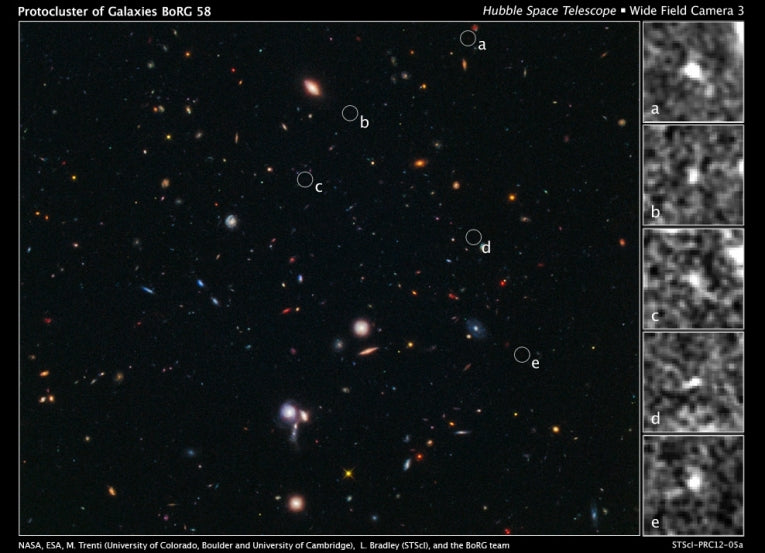An exciting discovery has been made of a cluster of galaxies that are in the very first stages of formation. This is the first grouping ever seen so far away in the early universe.
It was found using the Hubble Space Telescope during a random survey so was a complete chance discovery. They are in the very early stages and have existed since just 600 million years after the big bang.
There are no larger structures than galaxy clusters. They are made up of literally hundreds, or sometimes even thousands of different galaxies that are all held together by the force of gravity. Due to the time it takes for light to travel, the cluster is being seen as it appeared over 13 billion years ago, which is a staggering thought in itself.
Michelle Trenti, one of the researchers, said, "The result confirms our theoretical understanding of the build up of galaxy clusters and Hubble is just powerful enough to find the first examples of them at this distance."
Pretty much every galaxy in the known universe is part of a group or cluster. It is very hard to find a cluster in the early stages of development as they could be absolutely anywhere in the sky and are much dimmer than their more developed counterparts. Therefore this discovery is big news in the industry and has given an exciting insight into a previously unseen phenomenon.
Trenti continued, "We need to look in many different areas because the odds of finding something this rare are very small. It's like playing a game of Battleship : the search is hit and miss. Typically, a region has nothing, but if we hit the right spot, we can find multiple galaxies."
The easiest way to find these clusters is to instead hunt for the brightest galaxies that shine bright. These can then be a way of pinpointing where clusters may lay and it is this procedure that led to this discovery. How bright a galaxy is is dictated by mass. The more mass, the brighter it glows. The 5 bright galaxies that the NASA Hubble Telescope happened to see are only about 50% of our Milky Way or possibly even as little as 10% of the size. However, they are bright because they are feeding on huge amounts of gas through mergers with other galaxies. The research team have run simulations which show that eventually they will all merge together.
What the observations show is that the hierarchical model of galaxy assembly seems correct. This says that the small objects build up mass and merge to form increasingly bigger objects.
This is not the first observation of its type. Previously, a galaxy approximately 12.6 billion light years from Earth had been observed by a team of astronomers at the California Institute of Technology in Pasadena. Continued projects are now pushing the Hubble telescope to the very limit and the observations and research will continue. However, it is hoped that the next generation of telescopes will push limits even further and help to discover a galaxy at an even earlier stage of development. The goal at the moment is to find a galaxy that is at the stage of assembly that would be seen just 300 million years of the big bang. This could help to develop our understanding even further in this exciting field.










